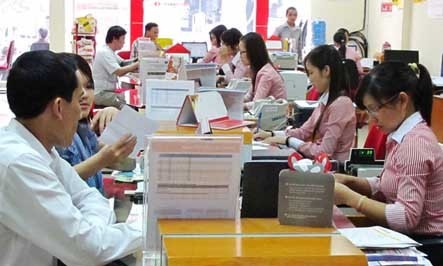 Economy
Economy

Strong efforts from the HCM City banking industry are needed to complete its mission in 2017, a high-ranking official has said.
 |
| Strong efforts from the HCM City banking industry are needed to complete its mission in 2017, a high-ranking official has said. — Photo diachidoanhnghiep.com |
HCM City — Strong efforts from the HCM City banking industry are needed to complete its mission in 2017, a high-ranking official has said.
Speaking at a conference held yesterday in HCM City, chairman of the city’s People’s Committee Nguyễn Thành Phong said the “the banking industry for many years has been considered the blood vessel of the economy and one of the most important industries of the city”.
During the 2011-15 period, the city’s banking industry reached an annual growth of 10.1 per cent, ranking second among other sectors in growth.
“This year, the city aims to collect VNĐ348 trillion (US$15.5 billion) for the State budget, an increase of 16.6 per cent year-on-year, and an increase of 26 per cent for city collections, ” he added.
To complete its mission, Phong has told the State Bank of Việt Nam (SBV) and commercial banks to improve supervision and inspection of credit activities for real estate projects and build-operate-transfer (BOT) transport projects; promote the restructuring of the banking industry; and settle bad debts.
“Increasing network security, ensuring safety for customers’assets and further mobilising local residents’ savings are the most important tasks for SBV and commercial banks,” Phong said.
Tô Duy Lâm, director of SBV’s HCM City branch, said that in 2016, total assets of the banking industry in HCM City increased 14.4 per cent to VNĐ2.9 quadrillion ($126 billion), with 10.7 million bank cards, a year-on-year increase of 8.1 per cent; and 36,500 POS, or growth of 8.6 per cent.
The local banking sector’s bad debt ratio was 3.6 per cent, a reduction of nearly 8 per cent compared with 2015.
“Last year, the monetary market and banking activities in HCM City remained stable, despite many unexpected events in the world’s economy, affecting the Vietnamese economy,” Lâm said.
By the end of 2016, the deposit interest rate was 4.8-5.2 per cent for đồng under six month terms, 6.6-7 per cent for over 12 months, and zero for US dollar loans.
The short-term lending interest rate for five priority industries was around 7 per cent and did not exceed 8.5 per cent for other industries. It was 8.7-9.7 per cent for medium- and long-term loans.
The foreign currency exchange rate increased 1.23 per cent compared with last year and total remittances were around $5 billion.
“The liquidity of the banking system remained stable and the safe operation index was ensured. Capital usage ratio was 82.9 per cent,” Lâm added.
He also said that banking activities in HCM City achieved growth and development, in which outstanding loans increased 19.3 per cent, the highest growth in recent years.
“Banking services developed well and business results of financial institutions improved,” he added.
Retail banking services and electronic banking like mobile and internet banking achieved high growth of more than 50 per cent compared with 2015.
“Activities that helped solve difficulties for the business community were executed well, with total outstanding loans of VNĐ770 trillion ($35 billion), an increase of 10 per cent over 2015, in which VNĐ145 trillion was borrowed at preferential interest rates,” Lâm added.
The Banking – Enterprises Connectivity programme allowed nearly 22,000 customers to borrow VNĐ281 trillion.
Lâm also warned that financial institutions in HCM City must be aware of potential risks, especially bad debt and slow restructuring, which could affect the sustainable and stable development of the banking system.
“Technological risks also need more attention,” he said.
This year, the banking industry in HCM City has set a goal of reaching 18 per cent credit growth, 16 per cent growth of capital mobilization, and bad debt under 3 per cent.
“The banking sector will continue to implement the credit programmes of the Government, SBV and the city,” Lâm added.
SBV Governor Lê Minh Hưng said that SBV “would pay attention to bank restructuring and settling of bad debts in 2017”.
Last year, SBV restructured five “special” banks and ensured safe operation of the entire system.
“We have reviewed the last five-year period of restructuring and settling bad debts and will release the next five-year plan soon,” he said.
In addition, SBV will work with agencies to map out a special law on supporting the banking sector in restructuring and resolving bad debts, which will include legal regulations.
Obstacles in existing legal regulations will also be addressed under the new law to remove hindrances in resolving bad debts.
The SBV has set a goal to gain credit increase of 16 per cent for a growth of 16-18 per cent in total payments, and will try to cut medium- and long-term interest rates, as well as stabilise the foreign currency exchange rate. — VNS




